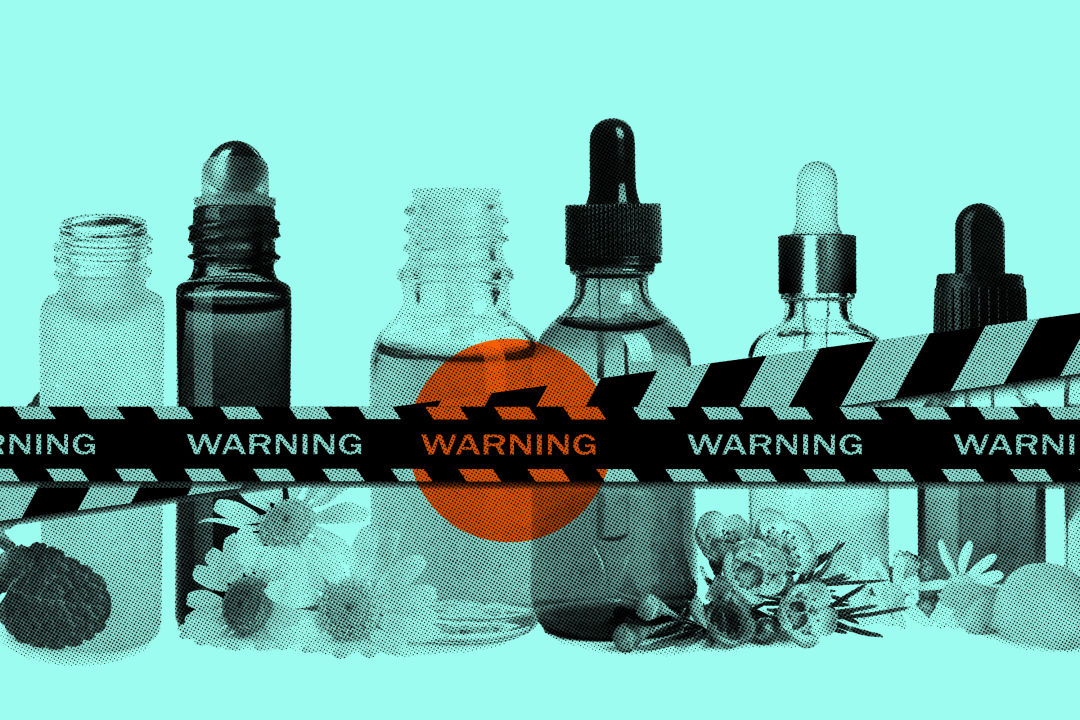What Are Some Safe Ways to Incorporate Essential Oils Into Your Routine?

Image: Gigi Ortwein
Have you ever used an essential oil on your skin and then broken out into a rash? These oils are advertised as safe and effective, but could be causing you more skin and health issues than not. It may not be the oil that's the problem, but the method of use. Here's what you need to know.
What are essential oils?
Essential oils are cold-pressed plant extracts packaged into small glass bottles and sold in several grocery and health food stores.
What are the most popular essential oils?
The most common are lavender, peppermint, eucalyptus, lemongrass and citrus oils, all thought to promote stress relief. Lemon oil mixed with water and vinegar can be a replacement for common household cleaning agents, and oil of oregano, in some small studies, has been touted as having antibacterial effects.
Are they FDA-approved?
Essential oils are not regulated by the Food and Drug Administration as a food or drug. Rather, they're considered "cosmetics," which means they are not recommended for ingestion.
Some websites, however, still claim you can ingest essential oils, even though they can cause a range of side effects from fatigue and headache to racing heart, confusion, vomiting and seizures. Ingestion can also cause bad interactions with medications and reduce their effects.
"Always be cautious around eating things that are not approved by the FDA," says Sarasota nutritionist Mikka Knapp.
"Whatever goes on your skin is absorbed into your bloodstream," Dr. Lauren Jane writes in a blog post for Sarasota Integrative Health. "I always tell my clients to make sure that whatever they put on their body, whether it's a facial cleanser, body wash, lotion or sunscreen, is something they would eat."
So, if ingestion of these oils is not recommended, how can we safely use them?
The answer is through inhalation, dilution and diffusion.
Inhaling lavender before bed or taking a few breaths of sweet orange oil can help you relax, according according to Healthline. Simply breathing in the scent an oil gives off can offer aromatherapeutic properties—without the substance entering your bloodstream.
Dilution involves taking a few drops of essential oil and mixing it with a tablespoon or more of a "carrier oil," and then applying it to the skin. Carrier oil is typically a vegetable-based oil that can be found in grocery stores, like olive or almond oil. Dr. Jane says coconut oil is another common carrier oil that also provides antioxidant and anti-inflammatory properties for the skin.
Diffusion is another common practice. Purchase an oil diffuser and fill it with water, then add two to three drops of the essential oil of your choice and turn on the diffuser. This will naturally dilute the oil and send it out as water vapor into your surroundings.
And if you have pets, be cautious: diffusion is safe, but there are some essential oils that can be harmful to pets when used, says Healthline. They include cinnamon bark, clove, lemongrass, peppermint and thyme. (Some pet-safe alternatives are cedarwood, fir, grapefruit, lavender, lemon, spearmint and tangerine.)
What are some ways you can determine if essential oils are right for you?
Try inhaling the scent of an oil by taking a few deep breaths. If you feel more relaxed and don't find your sinuses getting irritated or your head beginning to hurt, it could be beneficial.
Do a patch test on your skin. If you want to use an oil as a perfume, apply a small amount of your desired oil on the skin and let sit for 15 to 20 minutes. If any reaction (redness, burning or swelling) occurs, then avoid use.
Seek the advice of a holistic health expert. If you want to use essential oils as part of a daily routine, visit a holistic or integrative medicine health expert, who can help you create a personalized plan and who have the expertise and research to provide safe and effective regimens.
Never ingest essential oils that are advertised for cosmetic use under the Food and Drug Administration. It's tempting to put a few drops of lemon oil in your water or add citrus oil to something you're baking—but if it's not in the food aisle of the grocery store next to the olive or avocado oil, then it's not meant to ingest.
If you are looking for something solely for the benefit of skin moisture, using dermatologist-recommended products is advised. Find products with coconut or tea tree oil (both found to have beneficial properties for the skin).



